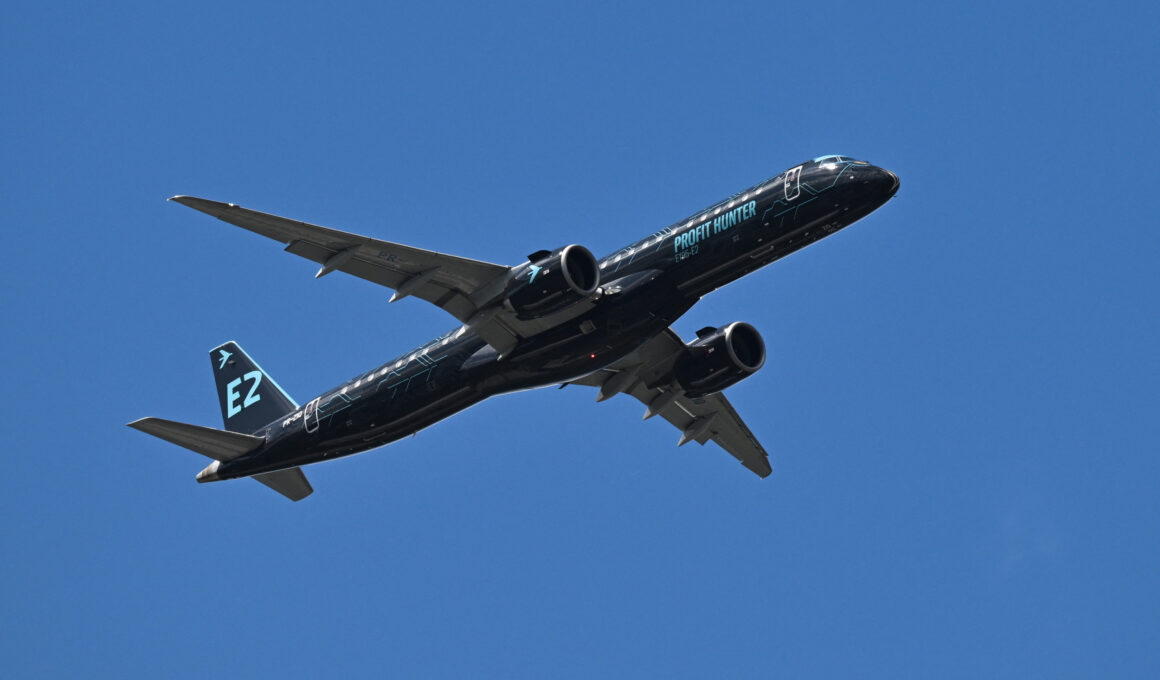Brazilian planemaker Embraer announced this week the introduction of a first-of-its-kind system that automates the takeoff process on E2 aircraft, one of its narrow-body commercial planes. The takeoff phase of flight has traditionally been managed solely by human pilots, and the new system promises to reduce the pilot workload in the cockpit.
The announcement was made at the Farnborough International Airshow, with the planemaker highlighting the system’s potential to optimize payload and increase range from challenging airports like London City (LCY). Embraer says, other than a software update, no aircraft modifications are required to automate the takeoff process.
Automation in flight phases has been a part of commercial aviation since the 1960s, though its use has become more prevalent over the past few decades, sparking some controversy in aviation circles.
Anxieties have been raised about the potential displacement of pilots and the reliance on automated systems. The Airline Pilots Association, the largest pilots union in the world, has expressed significant concerns about the shift towards autonomous flight operations.
“While ALPA supports the use of technology to enhance safety and sustainable growth initiatives for our air transportation system, the Association opposes, and will continue to oppose, some aspects of these new concepts such as autonomous flight operations, the application of artificial intelligence intending to remove pilots from the flight deck, or a reduction of human input at the controls of an aircraft,” a union spokesperson told Newsweek.
Embraer’s autonomous takeoff technology is a world first for any commercial aircraft. Scheduled to enter service by the end of 2025, the E2 Enhanced Take Off System (E2TS claims to offer an additional range of approximately 350 miles. While pilots remain responsible for heading and power lever settings, the system manages the rotation.
Ella Atkins, head of the Kevin T. Crofton Department of Aerospace and Ocean Engineering at Virginia Tech, said that the technical concerns about automated liftoff, one of the most crucial and complicated parts of any flight, were overblown.
She said that pilots already trust autopilots and instruments to safely fly through poor weather conditions. “Increasing this responsibility to takeoff will not be a substantial increase in trust for a well-trained pilot,” she said.
Embraer’s push towards automated takeoff systems underscores the delicate balance between technological innovation and aviation safety, coming in the wake of a pair of high-profile Boeing 737 crashes that were linked to a piece of automatized flight-control software that had not been properly transmitted to pilots.
While the E2TS promises increased efficiency and reduced pilot workload, Atkins does not believe that the automation of flight operations will replace pilots in the cockpit, as some have suggested.
“Flight crews will still monitor the automation and intervene until certification authorities such as the FAA approve fully autonomous flight (with no pilot supervision requirement). I expect at least one pilot to be required to supervise autonomy for the next decade, more because the community lacks trust in autonomy than because the autonomy cannot function reliably in all conditions it is asked to handle,” she said.
Despite advancements in on-board technology, there remains a significant trust deficit regarding fully autonomous systems, especially among the flying public. Atkins predicted that pilot supervision will remain a requirement for at least the next decade, though more due to a lack of trust rather than technical inadequacies.
Do you have a story Newsweek should be covering? Do you have any questions about this story? Contact LiveNews@newsweek.com
Uncommon Knowledge
Newsweek is committed to challenging conventional wisdom and finding connections in the search for common ground.
Newsweek is committed to challenging conventional wisdom and finding connections in the search for common ground.








